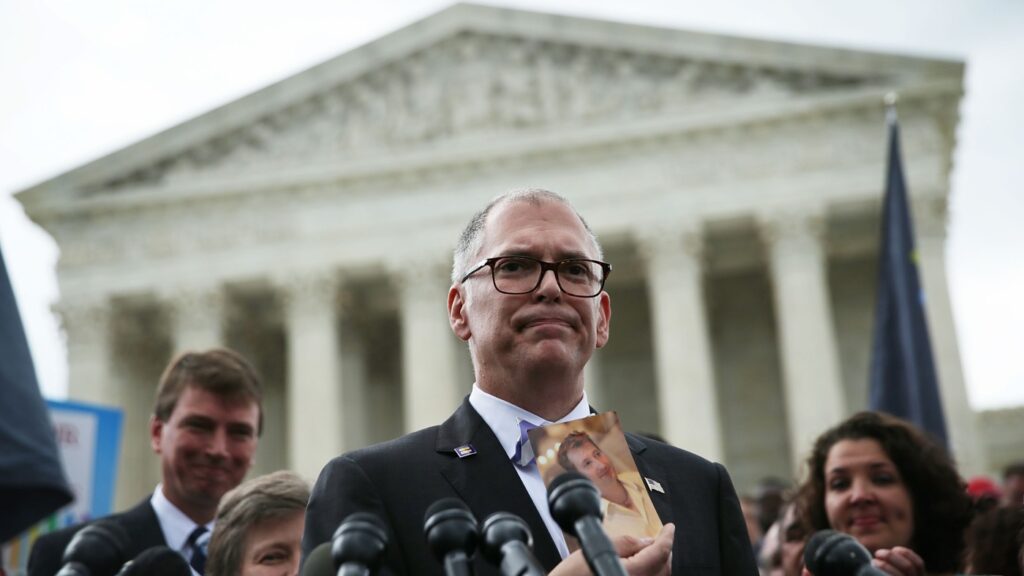
WASHINGTON, DC - JUNE 26: Plaintiff Jim Obergefell holds a photo of his late husband John Arthur as he speaks to members of the media after the U.S. Supreme Court handed down a ruling regarding same-sex marriage June 26, 2015 outside the Supreme Court in Washington, DC. The high court ruled that same-sex couples have the right to marry in all 50 states. (Photo by Alex Wong/Getty Images)
WASHINGTON, D.C. – A decade after a landmark Supreme Court ruling legalized same-sex marriage nationwide, Jim Obergefell reflects on the fight for equality and the ongoing challenges facing the LGBTQ+ community.
Immediate Impact of the Historic Ruling
Jim Obergefell’s legal battle for marriage equality culminated in the Supreme Court’s decision on June 26, 2015, in Obergefell v. Hodges, which ensured that same-sex marriages were recognized across all 50 states. This ruling was a monumental victory for LGBTQ+ rights, yet Obergefell remains vigilant about the future of these hard-won rights.
“John deserved to die a married man,” Obergefell said, recalling his late husband, John Arthur, whose battle with ALS inspired their legal fight.
Key Details Emerge from Obergefell’s Journey
Obergefell and Arthur’s journey to marriage began in 2013 when the Supreme Court partially struck down the Defense of Marriage Act, allowing the couple to marry legally in Maryland. Despite Arthur’s deteriorating health, friends and family raised over $10,000 for a medically equipped plane to facilitate their wedding on the tarmac of Baltimore Washington International Airport.
Legal Challenges and Personal Struggles
The couple’s marriage was not recognized in their home state of Ohio, prompting Obergefell’s legal challenge. “We simply wanted dignity,” Obergefell stated, emphasizing their desire for recognition and equality.
By the Numbers
- 2013: United States v. Windsor ruling recognizes same-sex marriage federally.
- 2015: Obergefell v. Hodges ensures marriage equality across all states.
- Over $10,000: Amount raised to facilitate Obergefell and Arthur’s marriage.
Expert Analysis and Community Concerns
Despite widespread acceptance of marriage equality, Obergefell expresses concern over potential rollbacks of LGBTQ+ rights. “It’s terrifying to see all of these attacks on the queer community,” he noted, highlighting the challenges faced by marginalized groups, particularly the transgender community.
Ongoing Advocacy and Public Opinion
Obergefell remains an advocate for LGBTQ+ rights, emphasizing the importance of continued vigilance and activism. “We have always raised our voices to say we exist,” he affirmed, underscoring the community’s resilience.
Background Context and Historical Significance
The Obergefell v. Hodges decision marked a pivotal moment in American history, transforming the landscape of civil rights for LGBTQ+ individuals. The ruling built on previous legal victories, such as United States v. Windsor, and set a precedent for future advancements in equality.
What Comes Next for LGBTQ+ Rights
As the nation reflects on the 10-year anniversary of this landmark decision, Obergefell emphasizes the need for ongoing advocacy to protect and advance LGBTQ+ rights. “We are fighting to maintain and hold on to the rights we have gained,” he stated, calling for continued support and action from allies and community members alike.
Obergefell’s reflections serve as a reminder of the progress made and the work that remains. His story, and the stories of countless others, highlight the enduring impact of the fight for equality and the importance of safeguarding these rights for future generations.
This digital article was edited by Obed Manuel. The radio version was edited by Lisa Thomson.







